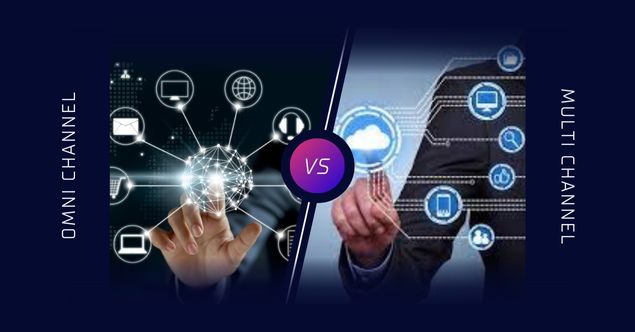Omnichannel and multichannel are two words that get thrown around a lot in the world of business and marketing. Omnichannel retail is a business model in which all existing channels become fully integrated to provide customers with a seamless shopping experience.
There are two types of retail stores: Omnichannel and Multichannel. Both have their advantages and disadvantages, but which should you choose?
This omnichannel retail strategy is empowered by centralized data management, which means that the distinctions among channels, both physical and online, are blurred.
Whereas Multichannel retail is the practice of selling or advertising products on more than one channel. The channels can be digital, physical or a combination of both. A business can sell products on its website or app, in a brick-and-mortar location and through different platforms or marketplaces.
Most retailers today are now operating both omnichannel and multichannel businesses. In fact, they're often required to operate both channels. The question remains -- which one makes sense for your business?
There are pros and cons associated with each type of retail store. Learn how to choose the right one for your business.
What does multichannel mean?
Multichannel refers to the use of another than one channel to retail and communicate data about a brand. These multiple channels aren't integrated with one another. A billboard, for example, isn't directly connected to a business ’ website; they're individual channels used to increase awareness of a brand.
What does omnichannel mean?
Omnichannel also refers to the use of more than one channel to communicate with clients. though, in this case, the multiple channels are integrated to produce an ideal experience for the client. In other words, a client can pick up on one channel where they left off on another.
What are the crucial differences between omnichannel and multichannel?
1) Client engagement vs client experience
One of the major differences between the two is that multichannel focuses on engaging clients, while omnichannel focuses on enhancing the client experience. With multichannel marketing, the aim is to cast the net as wide as possible to make additional and more people aware of a business. With omnichannel marketing, the aim is to create a consistent customer experience who are already aware of and engaging with a business.
2) Channel- centric vs customer-centric
The aim of multichannel marketing is to maximize the number of channels used to promote a business. With more channels, guests can choose how they want to engage with a business. The other channels offered, another choice the customer has.
For omnichannel, the customer, not the channel, is the focus. With the customer at the center, the goal is to give an ideal experience as they go from one channel to another, removing the conflict as they move between different touchpoints. Less interconnected channels are better than more unconnected channels.
3) Quantity vs Quality
Multichannel is all about expanding the number of channels available which are offered, the better. It increases reach and allows customers to select how to engage with a brand. However, there is no effort made to link up the channels, meaning customers have to begin from the start when they switch from one to another, which can hinder the quality of support received.
Omnichannel vs multichannel how to choose
Why choose multichannel?
Multichannel can be a good option if you ’re short on resources and can’t invest in a full omnichannel way. Since omnichannel marketing requires further work to execute, you may feel that it’s easier to stick with multichannel marketing because it can still bring good results.
The primary advantage of multichannel is that it offers inflexibility by allowing every channel to work on its own. The stakeholders of each channel do n’t need to worry as important about communication and can rivet on making up their channels.
However, this does n’t mean that going multichannel is cheap. You ’ll still have to have the right tech structure to gauge your multi-channel operations, withmarketing mechanization software playing a central function in the process to help you handle growth without sacrificing quality.
Why choose omnichannel?
Omnichannel marketing is a great option for businesses of all sizes, including smaller and growing ecommerce marketers, If done right.
While it’s true that going omnichannel can be an additional resource- exquisite in terms of investment and keep, the lucre of a successful omnichannel strategy is more than worth it. From smoother user experience and advanced client retention to more sales and more brand fidelity, omnichannel is the way to go if you ’re set to do the work.
With a solid launch on your marketing strategy, you can generate a unified channel that helps clients with their purchases while turning them into returning clients.
Once you decide on the right approach for your business, it’s essential to find marketing software that allows you to apply it the right way.
As a marketing mechanization platform, Omnisend is assembled not just for ecommerce, but for brands that want to explore all that omnichannel provides.
Summary
Customer experience is incredibly valuable to any business or firm and therefore should always be a focus with your decision, an omnichannel approach is better than a simple multichannel approach.
An omnichannel approach is still a multichannel approach, as it provides customers with more than contact and marketing channels. The difference is in treating all these channels as part of a complete, rather than each one separately.
FAQ's on Communication:
Omnichannel -- also spelt omnichannel -- is a multichannel approach to sales that seeks to provide customers with a seamless shopping experience.
In the omnichannel world, display advertising, search engines, social media, referral websites, e-mail and mobile marketing can be considered independent channels, as each can promote one-way or two-way communication.
Multi-channel refers to the use of several media channels for spreading marketing messages. This can include email, social media, print, mobile, display ads, television, and more.




